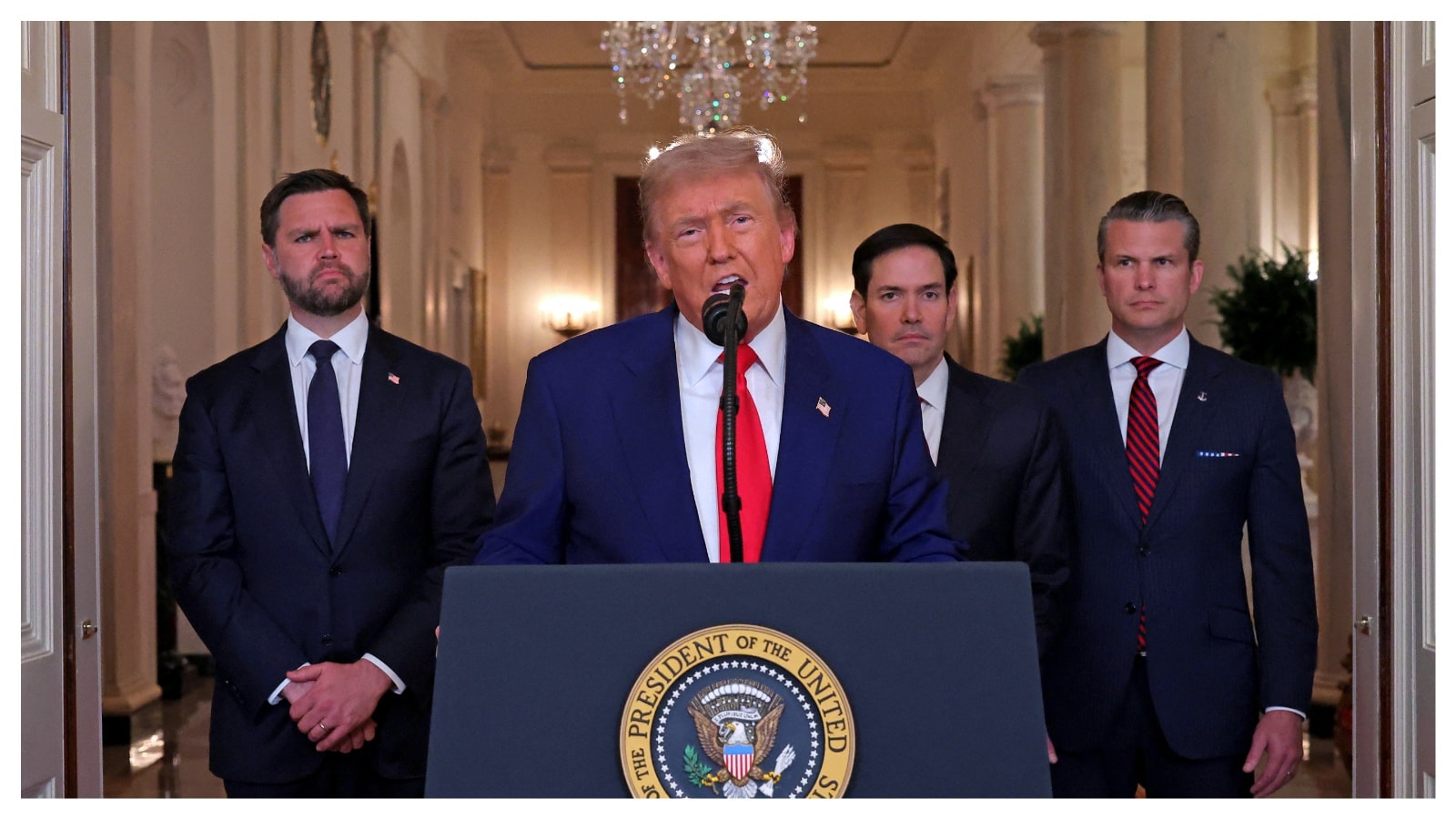Donald Trump’s Iran strikes: As Israel-Iran arrive at a US-mediated ceasefire in the 12-day conflict, one question remains – Did US President Donald Trump have the legal authority to strike Iran?
On Saturday night, the United States (US) struck Iran’s nuclear sites at Fordow, Natanz, and Isfahan using B-2 stealth bombers and Tomahawk missiles in what it termed Operation Hammer. Trump hailed the airstrikes on Iran as a “spectacular military success,” claiming that key nuclear facilities at Fordow, Natanz, and Esfahan were “completely obliterated”. Speaking after the coordinated assault, involving B-2 stealth bombers, Trump said the mission was executed flawlessly and marked a decisive blow to Iran’s nuclear ambitions.
Tehran retaliated by attacking one of the largest US air bases in the Middle East. Trump then announced that a ceasefire between Israel and Iran was “in effect”.
Since the US strikes, Democrats as well as lawmakers from his own party have questioned the move.
This is not Constitutional. https://t.co/EU3fS5jcwb
— Thomas Massie (@RepThomasMassie) June 21, 2025
DOUBTS RAISED ON DONALD TRUMP’S ACTIONS
Republican Congressman Thomas Massie said on X that the strikes were “not Constitutional”.
Another Republican Congressman Warren Davidson wrote on X: “While President Trump’s decision may prove just, it’s hard to conceive a rationale that’s Constitutional.”
While President Trump’s decision may prove just, it’s hard to conceive a rationale that’s Constitutional. I look forward to his remarks tonight. https://t.co/fvXyKiicUX
— Warren Davidson ?? (@WarrenDavidson) June 22, 2025
Republican Speaker of the House Mike Johnson defended the president: “The President made the right call, and did what he needed to do. Leaders in Congress were aware of the urgency of this situation and the Commander-in-Chief evaluated that the imminent danger outweighed the time it would take for Congress to act. The world’s largest state sponsor of terrorism, which chants “Death to America,” simply could not be allowed the opportunity to obtain and use nuclear weapons. The President fully respects the Article I power of Congress, and tonight’s necessary, limited, and targeted strike follows the history and tradition of similar military actions under presidents of both parties.”
The President made the right call, and did what he needed to do.
Leaders in Congress were aware of the urgency of this situation and the Commander-in-Chief evaluated that the imminent danger outweighed the time it would take for Congress to act.
The world’s largest state…
— Speaker Mike Johnson (@SpeakerJohnson) June 22, 2025
WHAT DOES THE US LAW SAY?
Article I of the US Constitution lists the ability “to declare war” as one of Congress’ powers.
Article II lays out the president’s powers saying “the president shall be Commander in Chief of the Army”
BBC quoted sources at the White House as saying they see this as the rationale for the strikes on Iran.
LEGAL EXPERTS’ ANALYSIS
In a piece, BBC Verify asked legal experts whether Trump’s actions were in line with the Constitution or whether he should have consulted Congress first.
“Constitutional experts have said that Article II gives the president the authority to use military force in certain circumstances. The circumstances aren’t specifically laid out in the Constitution – but they have been subsequently interpreted to include “actual or anticipated attacks” or to “advance other important national interests,” experts at the Council for Foreign Relations told BBC.
These interests could include the prevention of nuclear proliferation, which the Trump administration said was their justification for the Iran strikes.
Four constitutional experts told BBC:
“The short answer is yes, he did have the authority here,” Claire Finkelstein, a professor at the University of Pennsylvania Law School told BBC. “There is a long standing practice of presidents engaging in isolated military engagements without congressional approval.”
Constitutional law expert Jessica Levinson at Loyola Marymount University said the president has limited authority to authorise air strikes as long as it “doesn’t begin to resemble a war, and there is no clear definition of when that occurs”.
Andrew Rudalevige, a professor of government at Bowdoin College, said he didn’t believe Trump had the authority to launch the latest strikes as there wasn’t “a sudden attack to repel”.
John Bellinger, who was a legal adviser in the White House under President George W Bush, said: “Over the last several decades, Congress has acquiesced more and more in presidential uses of military force for a variety of purposes without congressional authorisation.”
Although Article I gives Congress the power to declare war, the provision has rarely been used. The last time Congress invoked this power was in 1942 during the Second World War.
WHEN PRESIDENTS ORDERED STRIKES WITHOUT CONGRESS NOD
Experts also said that presidents using their authority to order military actions without getting approval from Congress has become more common, said the BBC report.
President Barack Obama authorised airstrikes in Libya without requesting permission from Congress, which his administration justified under Article II, as was the case for the mission to kill Osama Bin Laden in Pakistan in 2011.
During Trump’s first term in office, he ordered the killing of Iranian military officer Qasem Soleimani without congressional approval.
Democratic President Bill Clinton launched strikes in the Balkans in the 1990s without prior approval.
Joe Biden did the same when hitting Houthi targets in Yemen as well as in Syria during his presidency.
WHAT ABOUT THE WAR POWERS RESOLUTION?
While giving President the power in case of an emergency, the War Powers Resolution — passed in 1973 following America’s withdrawal from the Vietnam War to limit the president’s ability to wage war without consulting Congress — states that they should “in every possible instance shall consult with Congress before introducing United States Armed Forces into hostilities”.
Secretary of Defense Pete Hegseth said following the strikes on Iran that Congress “were notified after the planes were safely out” and that they “complied with the notification requirements of the War Powers Act”.
Inputs from Agencies, BBC
